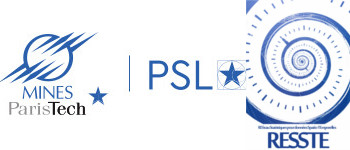This work deals with the characterization of geological reservoirs. Besides its specific interest in oil and gas industries, it can help to address issues and challenges encountered in the environmental sciences, namely, in geothermal energy, water management and CO2 storage. The reservoirs considered here are formed by channelized meandering systems. They are stochastically modeled using a process-based approach that mimics three interacting sedimentary processes (migration, aggradation and avulsion) to reproduce the evolution of the reservoir along geological time. In practice, it is important that the simulated reservoirs respect the available field information, such as well facies data or seismic data that provide sand proportions. To achieve this goal, a conditional simulation technique based on particle filtering has been developed. Particle filtering is a statistical technique based on the generation and the selection of so-called particles (in the present context, each particle is a reservoir simulation). The generation of the particles is made stepwise. At each step, the construction of each particle is resumed by stacking a layer of constant thickness made of sediments simulated unconditionally. Then, only the particles that respect at best the conditioning data are selected and replicated, so that the total number of particles remains the same. The simulation process terminates as soon as the top of the reservoir has been reached. One particle among all those produced is then randomly selected to serve as a conditional simulation. This novel approach has been implemented in FLUMY, a software developed by MINES-ParisTech to perform reservoir simulations. It will be presented in detail and illustrated using a case study.
|
|
|
|
Conditional simulation of channelized meandering reservoirs using particle filtering
1 : Centre de Géosciences, Equipe Géostatistique
MINES ParisTech - École nationale supérieure des mines de Paris
2 : Centre de Géosciences, Equipe Géostatistique
-
Site web
MINES ParisTech - École nationale supérieure des mines de Paris
35 rue Saint-Honoré 77305 Fontainebleau cedex -
France
3 : École des Mines de Paris
-
Site web
Ecole des Mines de Paris
60 boulevard Saint-Michel - 75272 Paris Cedex 06 -
France
4 : MINES ParisTech - Centre de Géosciences
MINES ParisTech, PSL Research University
5 : MINES ParisTech - Centre de Géosciences
MINES ParisTech, PSL Research University
35 rue Saint-Honoré. 77300. Fontainebleau -
France
|
| Personnes connectées : 14 | Vie privée |

|

 PDF version
PDF version